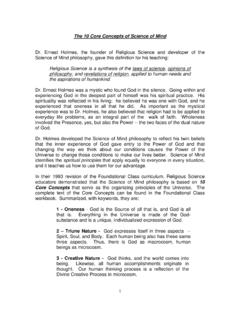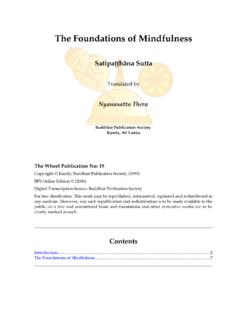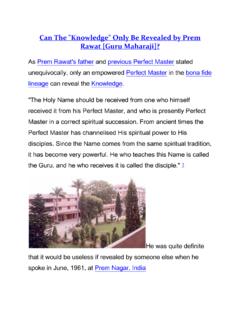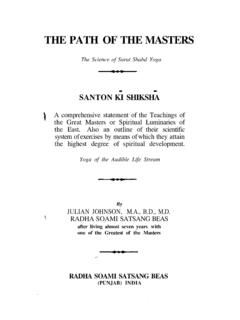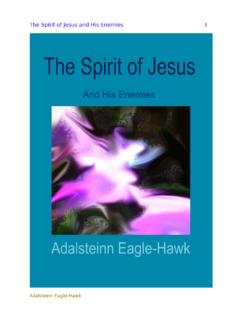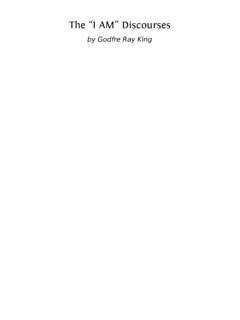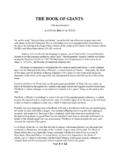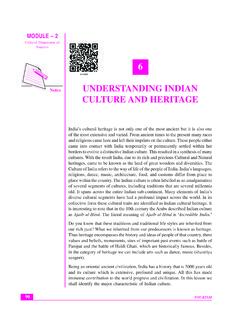Transcription of Nature of God - The Bahá’í Studies Web Server
1 Page 1 of 17 The Nature of god w w w . P r o j e c t N a a d . c o m Page 2 of 17 1 Contents Page 1 Contents Page 2 2 Introduction to God 3 3 Primary Theories Regarding the Nature of god 3 4 Sikh Teachings Regarding the Nature of god 4 Mool Mantra 4 Nirgun - Sargun 4 Is Nirgun Sargun a Contradiction? 5 The Names of god 5 Who Created God? 6 sikhism and God Theories 6 Theism is supported by sikhism 6 Monotheism is supported by sikhism 6 Monolatrism is supported by sikhism 7 Henotheism is supported by sikhism 7 Deism is partly supported by sikhism 7 Monism is supported by sikhism 8 Pantheism is supported by sikhism 8 Panentheism is supported by sikhism 9 Monistic Theism is supported 9 Substance Monotheism is supported (gods are different forms of the same underlying reality) 9 A Personal God who answers prayers is supported by sikhism 10 Summary on the Sikh concept of god 10 5 Proving the Existence of god 10 6 Common Questions about God 12 Do the evils in this world weaken our faith in God, or strengthen it?
2 12 If God is good, why did he make humans fallible, able to choose wrong? 12 What does God say about the way we use his creation? 12 How can God be distant to one person, but near to another? 12 If everything has God inside, then why is there evil? 12 7 Challenges to the Sikh concept of Nirgun-Sargun God 12 Quantum Physics and Nirgun-Sargun 13 The Empirical Evidence of Quantum Physics 13 Summary of Quantum Theory 15 An Example of Quantum Physics 15 New Technologies based on Quantum Principles 16 sikhism and Quantum Physics 16 Page 3 of 17 2 Introduction to God One of the most basic beliefs held by the majority of people within modern society is the belief in a being commonly known as God.
3 Theologians, Philosophers, Prophets, Gurus, Sages and Messiahs throughout history have held varied beliefs, in terms of their understanding regarding this power. The most common among these include omniscience (all knowledgeable), omnipotence (all powerful), omnipresence (everywhere), perfect goodness, eternal and a necessary existence. 3 Primary Theories Regarding the Nature of god In this next section we take a high level view at the varying Nature of theories regarding the Nature of god . We shall examine how many of those theories sikhism supports in a later section. Belief Name Belief Description Theism Belief in the existence of a god or divine being Monotheism Belief in the existence of one deity, or in the oneness of god Monolatrism Worship of a single deity independent of the ontological claims regarding that deity Henotheism Devotion to a single god while accepting the existence of other gods Deism Belief that one God exists.
4 However, a deist rejects the idea that God intervenes in the world. Monism Belief that everything is One and that there are no fundamental divisions Pantheism Belief that God is the natural world / universe Panentheism or Monistic Monotheism Belief that God is within every part of Nature , and timelessly extends beyond as well. Panentheism is essentially a unifying combination of theism (God is the supreme being) and pantheism (God is everything). While pantheism says that God and the universe are coextensive, panentheism claims that God is greater than the universe and that the universe is contained within God. Panentheism holds that God is the supreme affect and effect of the universe Monistic Theism This belief encompasses pantheism, monism, and at the same time the concept of a personal god Substance monotheism Belief that the many gods are different forms of a single underlying substance Polytheism Belief in or worship of multiple deities or gods.
5 In polytheistic belief, gods are perceived as complex personages of greater or lesser status, with individual skills, needs, desires and histories. These gods are not always as being omnipotent or omniscient; rather, they are often portrayed as similar to humans (anthropomorphic) in their personality traits, but with additional individual powers, abilities, knowledge or perceptions. Pandeism Belief combining deism where God can only be reached through reason and pantheism where god exists within Nature Personal God The broadest definition of this term is a god who is a personal being, a being with a personality, including the capacity to reason and feel love Atheism Belief in nothing supernatural or god like Page 4 of 17 Agnosticism Belief in some form of skepticism with regards to God as it is unknowable Ignosticism Similar to both weak atheism and agnosticism Misotheism A belief in hating or punishing gods for not fulfilling wishes or desires 4 Sikh Teachings Regarding the Nature of god Mool Mantra The Sikh Holy Scripture starts with the Mool Mantra which provides a concise insight into some of the eternal qualities of the supreme spirit.
6 One Universal Creator God. The Name Is Truth. The Creator who lives within Its creation. No Fear. No Hatred. Immortal, Without Form, Beyond Birth, Self-Existent. Realised By Guru's Grace ~ Chant And Meditate: True In The Primal Beginning. True Throughout The Ages. True Here And Now. O Nanak, Forever And Ever True. ||1|| (SGGSJ, ) Nirgun - Sargun The Nature of god in sikhism is called Nirgun-Sargun which describes two seemingly opposite states existing at the same time. Nirgun = without qualities or the unmanifested transcendent God Sargun = with qualities such as form, colour, weight, all-compassionate, all-knowing etc or manifested immanent God There are some lines in Gurbani which describe the Nirgun qualities of god , and some the Sargun qualities and some which describe a mixture of both.
7 The following quotes from Gurbani explore the ultimate Nirgun state of god . My Lord of the Universe is great, unapproachable, unfathomable, primal, immaculate and formless. (SGGSJ, ) He has no form, no shape, no color; God is beyond the three qualities. They alone understand Him, O Nanak, with whom He is pleased. ||1|| (SGGSJ, ) It was the Nirgun state of god which existed initially. Nirgun God created the material universe within which God also exists. So God assumed a form within His own creation and became Sargun, but at the same time remains in His Nirgun state. From formless, He appeared as form. The Creator has created the creation of all sorts. The attachment of the mind has led to birth and death.
8 He Himself is above both, untouched and unaffected. O Nanak, He has no end or limitation. ||2|| (SGGSJ, ) O imperishable, eternal, unfathomable Lord, everything is attached to You. ||7||The Lover of greatness, who dwells in heaven. By the Pleasure of His Will, He took incarnation as the great fish and the tortoise. The Lord of beauteous hair, the Worker of miraculous deeds, whatever He wishes, comes to pass. ||8||He is beyond need of any sustenance, free of hate and all-pervading. He has staged His play; He is called the four-armed Lord. (SGGSJ, ) Page 5 of 17 The following quotes from Gurbani talk about the dual Nature of Nirgun-Sargun states. He Himself is formless, and also formed; the One Lord is without attributes, and also with attributes.
9 Describe the One Lord as One, and Only One; O Nanak, He is the One, and the many. ||1|| (SGGSJ, ) He Himself is formless, and He Himself is formed; whatever He Himself does, comes to pass. (SGGSJ, ) You have thousands of eyes, and yet You have no eyes. You have thousands of forms, and yet You do not have even one. You have thousands of Lotus Feet, and yet You do not have even one foot. You have no nose, but you have thousands of noses. This Play of Yours entrances me. ||2|| (SGGSJ, ) Is Nirgun Sargun a Contradiction? Something being unmanifested and manifested at the same time would appear to be contradictory. But this is not difficult to explain with the advent of Quatum Physics with its refined understanding of Nature and her laws.
10 Quantum Physics breaks bi-valued logic by allowing matter (prakriti) to exist in a condition of superposition of many different states. This is supported by solid empirical data from experiments such as the double slit experiment and through the commercialisation of such principles into working technologies such as the quantum computer. So the Sikh concept of god is indeed a Quantum concept allowing the superposition of both a formless and formed state to exist simultaneously. There are other not so technical methods of understanding Nirgun-Sargun such as the qualities of the soul which are transcendent (Nirgun) and the form of the human body and the mind which is immanent (Sargun). For a person to enjoy life they need both the Nirgun and Sargun aspects of god to be working together (mind, body and soul).
